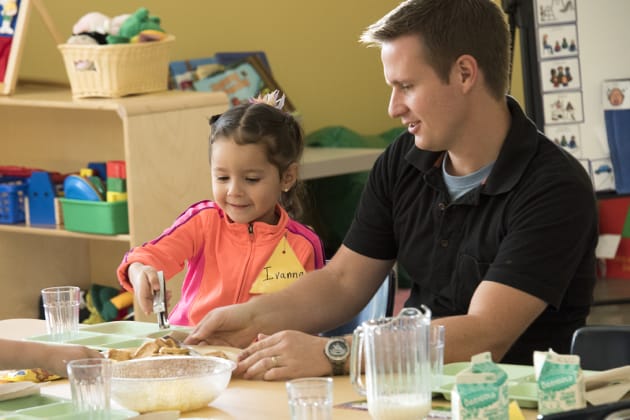 In January, the Oregon Department of Education’s Early Learning Division will begin accepting applications for a brand new stream of state funding for early learning: Preschool Promise. Preschool Promise will bring access to publicly-funded, high-quality preschool to more than 1,000 additional Oregon children each year.
In January, the Oregon Department of Education’s Early Learning Division will begin accepting applications for a brand new stream of state funding for early learning: Preschool Promise. Preschool Promise will bring access to publicly-funded, high-quality preschool to more than 1,000 additional Oregon children each year.
The program will begin to address gaps in who has access to high-quality preschool. The funding pays for preschool for kids from families whose income is up to 200 percent of the federal poverty level. Opportunities for families of color and in isolated areas will also increase because the program’s mixed-delivery approach is designed to be culturally-responsive and geographically wide-ranging.
During the 2015 legislative session, Oregon committed $17 million to the new program; the funding will go to high-quality preschools in a variety of settings including Head Start programs, preschools run by elementary schools and school districts, and private preschools.
The Children’s Institute worked closely with state leaders to develop the idea for Preschool Promise and helped to write the bill that was ultimately passed. We also played a key role in advocating for the legislation by conducting legislative visits, lining up testimony, and building a coalition of business and education organizations and groups working with communities of color that endorsed the bill.
“Thanks to the Oregon Legislature’s unprecedented investment in early childhood, we have a chance to show what we can do collectively to serve children and families,” says Gwyn Bachtle, Preschool Promise Program Coordinator at the state’s Early Learning Division. “Preschool Promise reflects that investment and we are looking forward to building a strong base for children to be successful throughout their educational careers.”
After the session ended in July, the Children’s Institute advised the state as it determined how the funds should be distributed. In January, all 16 of the state-designated “early learning hubs” will be eligible to apply for the funding on behalf of qualified preschools in their areas. A statute passed by the Legislature in 2013 authorized the creation of the regional early learning hubs that would focus on creating an aligned early learning system to ensure children arrive at school ready for success and families are supported to be healthy and stable.
Each of the hubs is a collection of program and service providers that prioritize aligning K-12, early learning, health services, and human services.
“Preschool Promise is an important step forward for Oregon,” said Dana Hepper, the Children’s Institute’s director of policy & program. “But getting the bill approved is only the first step. The Children’s Institute and our partners now will be working with the Early Learning Division to ensure that this program establishes a good foundation and that it rolls out and grows in a way that supports a diverse group of providers all focused on quality. That will be the key to building a program that works for all Oregon children.”
The program is tied to other state programs that are improving Oregon’s early learning system. For example, Oregon’s Quality Rating and Improvement System is how the state both determines whether a program has the quality to qualify for the state program and supports quality improvement. Programs that participate receive a star rating and learn how to improve that rating.
The application process emphasizes key readiness indicators that hubs must have in place to ensure the funding is used in a way that will make a difference for kids. These indicators were determined through a process that included hearings and meetings with more than 300 community members to get their input.
Here are the indicators the state has determined it will be looking for:
- Demonstrated Need and Connection to Community – includes indicators related to community needs, community and provider engagement, and parent engagement.
- Capacity to Support a Mixed Delivery Model – includes indicators that address areas of organizational capacity, financial qualifications, and governance.
- Capacity to Support High-Quality Preschool Programs – includes indicators aligned with accountability to outcomes, capacity to promote high-quality early learning, commitment to continuous quality improvement, and collaborative and effective professional development.
Early Learning Hubs selected to receive Preschool Promise funding will be announced in March, and participating preschools will start to reach out to families and hire staff in April and May (to reach out to families and hire staff). The state funding with then will begin serving preschool children in September 2016.
